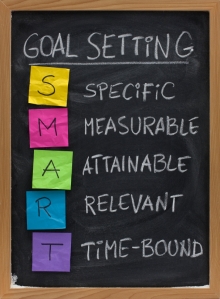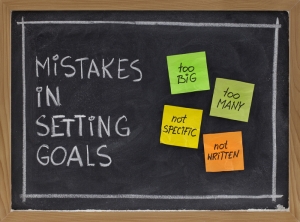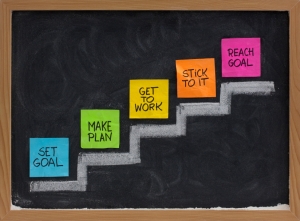So….in my 29 years, I have grown to be structured, schedule following, goal oriented and focused; but, when it came to my health as I got into my 20’s that seemed to slightly fall into a downward spiral. My goals focused on my career and education and everything else kind of fell by the waste side. An eye-opening moment for me was when I was asked to write down my health goals weekly. Of course I’ve always had these in my head, but never took the time to write them down.
So just a little background…I have my Masters in Healthcare Administration and one of my passions is strategic planning (nerdy I know 🙂 lol); starting this new journey I was finally able to look at my weight loss the same way. Why not look at it strategically? In class we learn setting S.M.A.R.T. goals. Find and make goals that are Specific, Measurable, Achievable, Realistic and Time-targeted. In any business it is important for those working on a similar project and/or goal to be clearly aware of what is expected of them. I have to say that setting goals has been one of the most rewarding and beneficial ways that I have found to continue my weight loss and health journey.
“Goals provide a sense of direction and purpose.”
~Goldstein
If you set clearly defined goals for you weight loss or any part of your life, you are able to take pride in the achievement of these goals. Completion of small goals helps boost self-confidence, you recognize the strength and the ability that you have within yourself, and hopefully begin to find an end to what seemed like a pointless and never ending journey; a light at the end of the tunnel.
So here are some goal setting tips that I learned in school, that I use in my life and work and have not transferred into my weight loss and health journey.
Set goals in a number of steps:
- What is your ULTIMATE goal in life? Figure this out before you start setting small goals. This ULITMATE life goal could turn into what is your ULTIMATE weight loss or health journey goal.
- Within this ULTIMATE life goal…what large-scale goals do you want to achieve that will help you get to this goal. What steps do you want/need to hit for you to succeed in achieving this ULTIMATE goal. Is losing 100 pounds your ULTIMATE life goal? If so, what large scale goals do you want to achieve that will eventually take you to that ULTIMATE goal…maybe its losing 10 pounds in 3 months, getting to where you can walk a couple of miles every day, etc.
- Now break these large-scale goals down even further. Make them more manageable, less overwhelming and more realistic. So allow yourself success. Write them down and make yourself accountable to your goals. By Monday you will sign up for the gym, by Wednesday you will have restocked you pantry and fridge with all clean foods.
Maybe you want to also write a personal mission statement to yourself. This may help you bring all of the big goals into one to two sentences, allowing you to focus in on the big picture.
When breaking down the large-scale goals into smaller ones, create to do lists, charts, count downs, etc. that you can visually see what you are doing to achieve the goal. For me, nothing feels more relaxing then crossing a line through something on my to-do lists (one of my favorite tools). Feel free to modify these to-do lists, charts, count downs, etc. periodically as they should be ever changing. We all know life changes minute to minute, so make sure these change with you. Priorities and experiences change to, so make sure you reflect these changes in all of the tools you create for yourself.
S.M.A.R.T. goals are an excellent tool for creating goals that are more realistic. All goals you create for yourself, especially those leading to your ULTIMATE achievement, should follow the SMART principle. I finally figured and realized that the use of the SMART principle as being applicable to daily life, including my weight loss and health journey. So here is what the SMART principle is:
Think SMART about your smaller goal setting; break goals down from years, too months, too weeks and if need be, days. So for example:
Goal: lose 1 pound this week – this goal is specific, it’s measurable, it is achievable, it’s realistic and my time target is one week.
Having smaller SMART goals, such as the example, allows you to be successful, building the self-confidence in yourself and your ability. We all have to crawl before we can walk and then run. So don’t be afraid to make the goals simple and small, because we all have to start somewhere.
I found myself working hard, but not seeming to get where I wanted to be or at least anywhere worthwhile. At the beginning of my health journey, I realized that I hadn’t spent enough time thinking about what I really wanted. I was essentially setting out on a major journey with what seemed to be no real destination.
Setting goals gives you a long-term vision and short-term motivation.
When you feel more confident in yourself and you find that your goals are starting to get to easy, make them harder. Don’t be afraid to challenge yourself. Hurdles and difficulty are not a sign of failure. Dust yourself off and jump right back into it. The number of hurdles and obstacles I have found have been immense, but I learned that one, and sometimes a couple of days of obstacles, didn’t mean I failed. I had to change my way of thinking and approach it as a learning experience. If I am ever in a situation like this again, how can I handle it better or be better prepared? Planning and preparing are two important factors in goal achievement success. Remember…you are changing habits in your life that you have been doing for years, obstacles and hurdles will happen. Just don’t get down on yourself and always have that end goal in mind to help with the extra motivation.
So….decide what you really want and separate what’s really important from the distractions and the irrelevant (just doing it because it sounds good or cool). Motivate yourself to set the goals and achieve them slowly to build your self-confidence and motivation; and don’t be afraid to reward or pat yourself on the back for your success.



